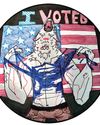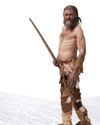
Nearby, Jarrad Hampton-Marcell is waiting. But he's not a police officerhe's a researcher, an assistant professor studying microbial ecology at the University of Illinois Chicago. He set up this robbery, and many others like it, as a science experiment. He's part of an effort to develop a brand new way to catch criminals-by collecting and analyzing their microbes.
Microbes include bacteria, fungi, and other microscopic critters. They cover your body, inside and out. But these miniscule hitchhikers don't always stay put. You breathe them in and out. Clouds of microbes waft off your skin all the time, landing wherever you happen to be and coating whatever you might touch. "We shed bacteria all of the time," says Hampton-Marcell. "We shed about 30 million cells per hour." Like it or not, every single one of us is Pig-Pen from the Peanuts cartoon, surrounded by a cloud of invisible bugs.
And this cloud could say a lot about you. "Your microbial community is very unique to you," says Hampton-Marcell. He explains that the choices you make, such as the foods you eat, how active you are, and what antibiotics you take, "shape not only your life but also your microbial community." When you leave microbes from that community behind on the things you touch, you're leaving clues about who you are. It's a fingerprint made of microbes.
Whodunit?
Hampton-Marcell and his team set up the staged robbery in New York to find out if they could catch a robber using only these microbial fingerprints. Collecting such a fingerprint is easy-you just rub a cotton swab over the surface and then seal it inside a sterile container.
This story is from the Muse January 2025: Invisible Kingdom edition of Muse Science Magazine for Kids.
Start your 7-day Magzter GOLD free trial to access thousands of curated premium stories, and 9,000+ magazines and newspapers.
Already a subscriber ? Sign In
This story is from the Muse January 2025: Invisible Kingdom edition of Muse Science Magazine for Kids.
Start your 7-day Magzter GOLD free trial to access thousands of curated premium stories, and 9,000+ magazines and newspapers.
Already a subscriber? Sign In

A 12-Year-Old Girl's Election Sticker Is a Winner
VOTING IS A FUNDAMENTAL FREEDOM FOR AMERICANS, A MEANS OF DOING ONE'S CIVIC DUTY AND A WAY AN INDIVIDUAL CAN EXPRESS THEIR VOICE. In 1971, the United States lowered its voting age to 18. But that doesn't mean kids and teens under 18 can't participate in elections in various ways.

If everything the human brain does is basically sets of electrical impulses, how exactly does that translate into a state of mind?
You're not the only one asking this question. Every neuroscientist in the world is wondering the exact same thing, says Zach Mainen

EARTH'S TINIEST BUILDERS
THE HIDDEN WORLD OF MICROBES IN THE EARTH'S CRUST

MUMMIES SPEAK
ABOUT MICROBES, MIGRATION, AND MORE

GOING WITH YOUR GUT
HOW DO MICROBES AFFECT OUR HEALTH? LET'S COUNT THE WAYS...

BUG Detective
A burglar sneaks into a house on a quiet street in New York City. He walks through the house, touching countertops and door handles. Finally, he steals a single card from a full deck. Then he leaves.

Little Creatures Among Us THE MANY MICROBES IN OUR DAILY LIVES
When you think you're alone, you're actually not. In the ground, the air, your room, and even your body are Strillions and trillions of creatures so tiny you can't see them.

A Mars Rock Found With Leopard Spots Could Be a Sign of Ancient Life
IN JULY, NASA'S PERSEVERANCE ROVER CAME ACROSS A SPOTTED ROCK IN WHAT WAS ONCE A RIVERBED IN THE JEZERO CRATER ON MARS.

Para Athlete Uses Exoskeleton Suit to Carry the Olympic Torch
In July, a 36-year-old French tennis para athlete, Kevin Piette, got a chance to participate in this summer’s Olympic torch relay without using a wheelchair.

Ancient Egyptians May Have Used a Water System to Lift Stones to Build Pyramid
HOW ANCIENT EGYPTIANS BUILT THE MASSIVE PYRAMIDS IN EGYPT MORE THAN 4,000 YEARS AGO HAS LONG BEEN A TOPIC OF WONDER AND DEBATE.